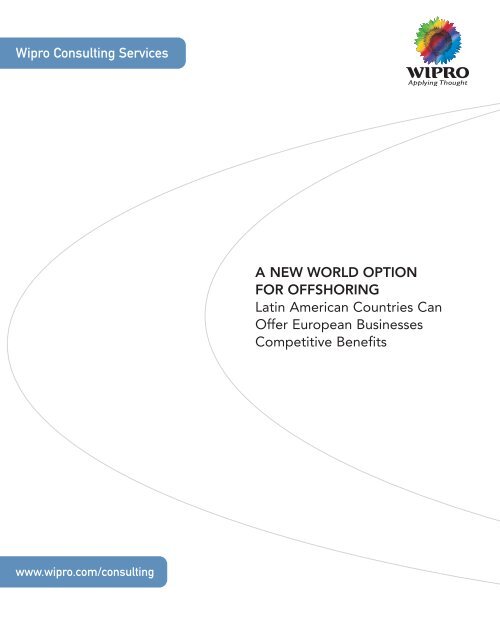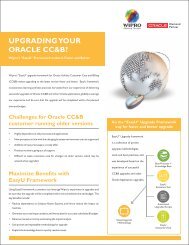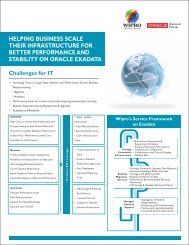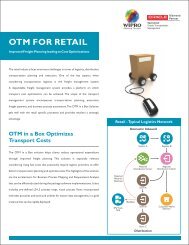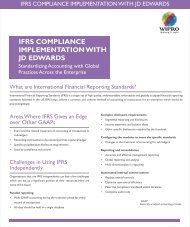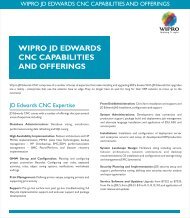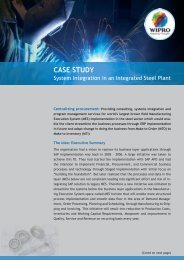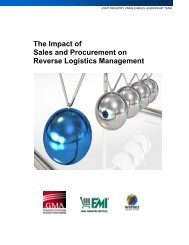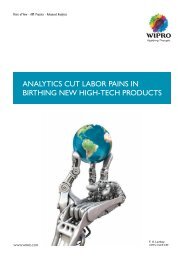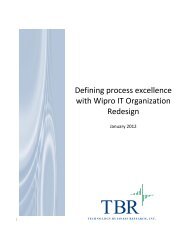A NEW WORLD OPTION FOR OFFSHORING Latin American - Wipro
A NEW WORLD OPTION FOR OFFSHORING Latin American - Wipro
A NEW WORLD OPTION FOR OFFSHORING Latin American - Wipro
You also want an ePaper? Increase the reach of your titles
YUMPU automatically turns print PDFs into web optimized ePapers that Google loves.
<strong>Wipro</strong> Consulting Services<br />
www.wipro.com/consulting<br />
A <strong>NEW</strong> <strong>WORLD</strong> <strong>OPTION</strong><br />
<strong>FOR</strong> <strong>OFFSHORING</strong><br />
<strong>Latin</strong> <strong>American</strong> Countries Can<br />
Offer European Businesses<br />
Competitive Benefits
About <strong>Wipro</strong> Consulting Services<br />
<strong>Wipro</strong> Consulting Services helps companies solve today's business issues while thinking ahead<br />
to future challenges and opportunities. As a business unit of <strong>Wipro</strong>, one of the world's leading<br />
providers of integrated consulting, technology and outsourcing solutions, we bring value to our<br />
clients through end-to-end business transformation – think, build and operate. Our model for the<br />
includes implementing lean process transformation, exploiting<br />
new technology, optimizing human capital and physical assets and structuring next generation<br />
partnering agreements that create value and win/win business outcomes for our clients.
Contents<br />
Introduction . . . . . . . . . . . . . . . . . . . . . . . . . . . . . . . . . . . . . . 2<br />
What benefits does <strong>Latin</strong> America offer?. . . . . . . . . . . . . . . . 2<br />
Which location brings the best benefits?. . . . . . . . . . . . . . . . 5<br />
<strong>Latin</strong> America vs Asia . . . . . . . . . . . . . . . . . . . . . . . . . . . . . . . 6<br />
Conclusions. . . . . . . . . . . . . . . . . . . . . . . . . . . . . . . . . . . . . . . 8<br />
Appendix . . . . . . . . . . . . . . . . . . . . . . . . . . . . . . . . . . . . . . . . 9<br />
Abstract<br />
<strong>Latin</strong> America is developing into an attractive offshoring alternative to Asia for<br />
Europe-based businesses. <strong>Latin</strong> <strong>American</strong> countries offer tremendous cost<br />
savings in wages, real estate, infrastructure, travel and tax incentives. It has<br />
highly skilled young workers with excellent language skills, and there are cultural<br />
similarities to Europe due to immigration patterns. <strong>Wipro</strong>'s comprehensive<br />
ranking guide to <strong>Latin</strong> America, which scores countries on cost effectiveness,<br />
talent and resource availability and business catalyst qualities, can help Europebased<br />
businesses identify the best fit for offshoring their operations.<br />
1
2<br />
A <strong>NEW</strong> <strong>WORLD</strong> <strong>OPTION</strong> <strong>FOR</strong> <strong>OFFSHORING</strong><br />
<strong>Wipro</strong>’s Research and Experience Demonstrate that <strong>Latin</strong><br />
<strong>American</strong> Countries Can Offer Competitive Benefits to<br />
European Organisations<br />
By Juan Diaz<br />
Great value. Tremendous resources. These are two of the many positives <strong>Latin</strong><br />
America offers as an offshoring location. <strong>Latin</strong> America has become a draw to<br />
industry players in the last several years as we’ve seen Business Process<br />
Outsourcing (BPO), Shared Service Centres (SSC) and Call Centres grow<br />
significantly in the region. Not only are large multinationals such as <strong>American</strong><br />
Express, General Motors and Intel running their operations there, but wellknown<br />
global BPO service providers, including <strong>Wipro</strong>, have established delivery<br />
centres. In fact, <strong>Wipro</strong> currently delivers finance and accounting services to the<br />
largest beverage company in <strong>Latin</strong> America from a service centre in Curibita,<br />
Brazil.<br />
But <strong>Latin</strong> America, like Europe, is comprised of many countries with unique<br />
cultures, governments and levels of business maturity. So, it takes experience in<br />
the region to identify and understand the subtle differences in opportunities that<br />
each country has to offer. Our research and work with clients entering this region<br />
has allowed us to develop an understanding of what is developing in each<br />
country and what the region as a whole has to offer.<br />
What benefits does <strong>Latin</strong> America offer?<br />
When we evaluate the benefits that <strong>Latin</strong> America offers, what rises to the top<br />
are cost effectiveness, a skilled workforce, language capabilities and cultural<br />
similarities. And, while most of these benefits clearly create an advantage to<br />
U.S.-based companies, which of course have greater geographical proximity,<br />
these benefits are just as advantageous to European-based organisations. Below<br />
are some of the key benefits we have found that the region offers:<br />
Costs: Our research on behalf of clients has shown that as a whole <strong>Latin</strong> America<br />
offers a wage arbitrage opportunity of about 30 percent when compared to the
U.S. and Western Europe. Colombia provides the most favourable cost benefits<br />
in the region, followed by Argentina. Yes, cost savings still remain greater in Asia.<br />
However, it is hard to predict how long those savings will be sustainable given<br />
that Asia is seeing far higher wage inflation than <strong>Latin</strong> America and the<br />
projections do not foresee any reduction in the annual increase in the years to<br />
come (inflation in India reached 14 percent in May 2010 while countries like Chile<br />
reached only 1 percent).<br />
Compared to European offshoring and nearshoring locations, <strong>Latin</strong> America<br />
certainly provides greater savings. A study by A.T. Kearney shows that Eastern<br />
Europe provides wage arbitrage opportunities of 15 to 25 percent while <strong>Latin</strong><br />
America can deliver labour wage cost savings of 20 to 40 percent.<br />
Skills: <strong>Latin</strong> America has a large pool of young (an average of 27 years of age)<br />
and highly skilled workers for SSC and BPO services. Brazil, where <strong>Wipro</strong> has a<br />
service centre, has the highest number in the region because of its large<br />
population (198.7M). However, we have found that having the biggest<br />
population size does not necessarily mean having greater availability of skilled<br />
resources. As shown in the table below, the availability of this pool is higher<br />
today in other locations independent of their size:<br />
Index Availability of Qualified Labor<br />
Argentina<br />
Brazil<br />
Mexico<br />
Chile<br />
Colombia<br />
3.58<br />
4.41<br />
4.72<br />
5.79<br />
6.28<br />
0 1 2 3 4 5 16 7<br />
Source: The World Competitiveness Yearbook 2008 - (10 = Full availability of qualified workers)<br />
3
4<br />
There are many universities in <strong>Latin</strong> America’s main cities. This combined with<br />
South America’s constant economic crisis over the last decades, has made the<br />
labour market extremely competitive. This has not only improved labour skills,<br />
but has forced universities and other education facilities to invest in new and high<br />
quality programmes.<br />
Language Capabilities: <strong>Latin</strong> <strong>American</strong>s are known for their language skills, which<br />
allow their countries to provide services to both English- and Spanish-speaking<br />
customers. Argentina, Mexico and Costa Rica have the best English-speaking<br />
capabilities in the region. We have found that other countries currently emerging<br />
on that front are Guatemala and Nicaragua. Additionally, Guatemalans, like<br />
Colombians, have a neutral accent that allows them to assimilate other Spanish<br />
accents and they are very good English speakers.<br />
Nicaragua, on the other hand, has experienced a massive migration of people to<br />
the U.S., caused by the country’s political instability. This, and the fact that many<br />
Nicaraguans have migrated back to their country, has improved the availability<br />
of English-speaking labour. However, political instability continues to stymie<br />
foreign investments that could potentially develop this sector in the country.<br />
Cultural Similarity: North America and <strong>Latin</strong> America have plenty of cultural<br />
similarities, including common European immigrant groups. Countries in these<br />
regions have been influenced by European migration over the past decades.<br />
Argentina for example, has been heavily influenced by Italian and Spanish<br />
immigration. Additionally, a significant pool of qualified <strong>Latin</strong> <strong>American</strong>s has<br />
migrated to the U.S. and Europe, either to apply to various post-graduate<br />
degree programmes (such as MBAs) or to seek new opportunities that decades<br />
of local South <strong>American</strong> economic crises and high unemployment rates have<br />
made unattainable. Many from this labour pool have since returned to their<br />
home countries and have brought with them not only greater skills and<br />
experience, but also some of the cultural nuances of their adopted country that<br />
play a key factor in business relationships. These cultural similarities are key in a<br />
BPO environment, and we’ve found that they help improve the interaction<br />
between the retained organisation and the outsourcer.
Which location brings the best benefits?<br />
Across <strong>Latin</strong> America there are locations where companies can successfully<br />
establish operations to achieve a more efficient operating model. Argentina,<br />
Brazil, Chile, Colombia and Mexico are among the most popular <strong>Latin</strong><br />
<strong>American</strong> locations for establishing operations. <strong>Wipro</strong> has developed a ranking<br />
methodology to help organisations decide which of these countries would offer<br />
the greatest benefits based on their needs and priorities. The ranking method is<br />
based on three primary business criteria, each composed of a group of key<br />
factors, as described below:<br />
1. Cost effectiveness: Accounts for 40 percent of the overall ranking and is<br />
made up of three factors, with their own percentage weight:<br />
• Compensation cost (40 percent): The average wages and average salary<br />
of BPO professionals<br />
• Infrastructure cost (40 percent): Includes the average cost for Internet,<br />
real estate, utilities, telecoms and airfare cost to major destinations<br />
• Tax and regulatory cost (20 percent): Includes the tax burden, currency<br />
fluctuation and corruption perception rate<br />
2. Talent and resource availability: Accounts for 40 percent of the overall<br />
ranking and is made up of two factors:<br />
• Education and language skills (40 percent): Incorporates the number of<br />
graduates per year; the adult literacy rate; mean scores on available tests<br />
(i.e., TOEFL) and quality in science, mathematics and management<br />
programmes<br />
• Business process experience and skills (60 percent): Includes availability<br />
of qualified labour, workforce size, IT-BPO market size and number of<br />
CMM/CMMI certified centers<br />
3. Business catalyst: This represents the quality of the overall business<br />
environment and accounts for 20 percent of the overall ranking. Three<br />
factors weigh in here:<br />
• Country environment (40 percent): Business risk, political stability, quality<br />
of living, personal safety and employment rigidity<br />
• Infrastructure (40 percent): Includes quality of overall infrastructure,<br />
availability of Internet bandwidth, telecom quality and utilities quality<br />
• IP Security (20 percent): Includes protection of property rights and<br />
protection against software piracy<br />
5
6<br />
The combined score, as shown in the table on page 7, provides a consolidated<br />
ranking per location and describes some of the key strengths and weaknesses<br />
for each country.<br />
While our methodology shows Colombia, Brazil, Chile, Argentina and Mexico to<br />
be the highest ranked offshoring destinations, other <strong>Latin</strong> <strong>American</strong> locations<br />
are gaining traction. For instance, a global BPO supplier opened operations in<br />
Guatemala in 2005 to provide nearshore services to U.S. clients and in 2008<br />
started Financing and Accounting operations for Coca-Cola. Also, one of India’s<br />
key players, which currently employs around 1,000 people, is looking to expand<br />
Finance and Accounting operations in the country by setting up a second<br />
delivery centre. Guatemala is a country that has cultural affinity to the U.S., a<br />
highly qualified labour force with bilingual capabilities (Spanish and English) and,<br />
like Colombia, its speakers have a neutral accent that allows them to assimilate<br />
any Spanish accent, making it ideal for call centre services.<br />
We’ve found clear signals that Uruguay is also looking to grow within the BPO<br />
and SSC sectors. For example, in March 2010, a 600,000-square-foot free trade<br />
zone called Aguada Park was opened to provide a high-tech infrastructure to<br />
companies delivering contact centres, BPO and SSC services (among others) in a<br />
well-located region and with low infrastructure and labour costs.<br />
Peru is another country that has managed to catch the attention of global BPO<br />
service providers. In fact, one of the biggest Indian suppliers has recently<br />
announced the opening of a service delivery centre in Lima as part of its <strong>Latin</strong><br />
America growth strategy.<br />
<strong>Latin</strong> America vs Asia<br />
So where does <strong>Latin</strong> America stand in comparison to Asia? Although <strong>Latin</strong><br />
America shows a promising future, the region is not yet as mature as Asia is<br />
today. We’re well aware that Asia remains the most developed and popular<br />
destination for offshoring clients due its low labour costs, specialised skills and<br />
experienced offshoring community. However, Asia is struggling with factors such<br />
as rising wage costs, increasing inflation and currency fluctuation. <strong>Latin</strong> America<br />
doesn’t suffer the inflation rates and wage increases Asia suffers every year and<br />
it contains a good mix of labour skills and low operational costs.
Country Ranking Advantages Disadvantages<br />
Colombia<br />
Brazil<br />
Chile<br />
Argentina<br />
Mexico<br />
(3.34)<br />
(3.08)<br />
(2.98)<br />
(2.91)<br />
(2.70)<br />
• Lowest wage cost and<br />
real estate in the region<br />
• Availability of skilled<br />
resources<br />
• Sector rapidly growing in<br />
the last years (76%<br />
growth in BPO and IT<br />
services in 3 years (2005-<br />
2008) - growing market of<br />
US$ 1 billion)<br />
• Strong government<br />
support (initiated in 2008)<br />
• Free Trade Zone specially<br />
designed for IT services<br />
companies: 50% off<br />
corporate tax and sales to<br />
the local market<br />
• Availability of skilled<br />
labour (overall population<br />
of 198.7 M and produces<br />
65,947 IT and business<br />
graduates annually)<br />
• Largest economy in the<br />
region<br />
• Most developed and<br />
mature ITO sector<br />
compared to other<br />
locations<br />
• Strong political and<br />
economic stability<br />
• Strong government<br />
support<br />
• Cultural affinity<br />
• Lowest wage cost in the<br />
region after Colombia<br />
• Highest language<br />
capabilities in the region<br />
• Cultural affinity<br />
• Sustainable exchange rate<br />
• Exported US$ 770 M in IT<br />
services in 2008<br />
• Availability of skilled<br />
labour<br />
• Language capabilities<br />
• Cultural affinity<br />
• Most developed BPO<br />
industry<br />
Source: <strong>Wipro</strong> Consulting research and Public source (5=Best ranking)<br />
• Historical violence and<br />
instability perception<br />
• Less developed market<br />
in region compared to<br />
other locations in the<br />
region<br />
• Low government<br />
support<br />
• Limited Spanish and<br />
English speakers<br />
• Limited Language<br />
capabilities (2% of<br />
population speaks<br />
English)<br />
• Highest wage cost<br />
compared to other<br />
locations.<br />
• Political and economic<br />
instability<br />
• Low government<br />
support<br />
• Vague rules for foreign<br />
investments<br />
• Strong presence of<br />
labour unions<br />
• Strong bureaucracy<br />
• Limited availability of<br />
skilled labour<br />
• Low government<br />
support<br />
• High violent crime<br />
statistics<br />
• Highest overall cost<br />
compared to other<br />
locations.<br />
Companies<br />
Operating<br />
Comments<br />
Citibank Negative publicity about guerrilla,<br />
drug cartels and high crime rates<br />
has slowed investments by<br />
corporations. However, during<br />
Alvaro Uribe’s presidential period,<br />
security and crime rates have<br />
improved significantly. Today,<br />
countries like Brazil and Mexico<br />
are ranked as even more<br />
dangerous and risky locations.<br />
With a good combination of low<br />
cost, talent pool and government<br />
support, Colombia is becoming<br />
among the best options in <strong>Latin</strong><br />
America, especially in Call<br />
Centres. The number of local and<br />
foreign BPO suppliers operating<br />
in Colombia and the significant<br />
growth the sector has had in the<br />
last couple of years, show the<br />
country is gaining the confidence<br />
of foreign companies.<br />
Nestle<br />
HSBC<br />
Air France<br />
Unilever<br />
Exxon<br />
Procter &<br />
Gamble<br />
• Largest call centres industry in<br />
the region<br />
• Very strong telecom network<br />
(150 million mobile phones in<br />
operation and 50% of<br />
households linked to broadband<br />
by the end of 2011)<br />
Chile is ranked as one of the best<br />
Spanish-speaking delivery<br />
locations. It’s pushing to grow in<br />
the sector by covering operations<br />
as an offshoring location for<br />
companies in Spain.<br />
Inflation in 2009 was 13% and it is<br />
predicted that Argentina will<br />
suffer higher inflation increases in<br />
2010, which adds an additional<br />
risk when offshoring to this<br />
location. It is key that these<br />
projections are assumed in the<br />
business model to ensure benefits<br />
realisation in the long term.<br />
Santander • Biggest call centre industry in<br />
the region after Brazil<br />
• Proximity to US attracts US<br />
customers<br />
7
8<br />
Conclusions<br />
Multinational companies that are considering the business case for offshoring<br />
must assess all regions and locations, evaluate their advantages and<br />
disadvantages, and target the one that best fits their business strategy and offers<br />
the greatest long-term benefits. Many traditional offshoring venues are now<br />
undergoing changes that will impact the bottom-line advantages offered in the<br />
past while new locales are emerging that could offer tremendous opportunities<br />
to the right organisation.<br />
<strong>Wipro</strong> has been on the ground in <strong>Latin</strong> America and has conducted extensive<br />
research on the factors that are important to 21st-century business success. It is<br />
clear to us that if the countries in this region have not been part of the equation<br />
in these evaluations, their growing strengths in the form of value and resources<br />
should put them in the mix as contenders to help create a strategic<br />
organisational advantage.<br />
Juan Diaz is a Consulting Manager, Finance and Accounting, for <strong>Wipro</strong> Consulting's Europe Practice.<br />
As a specialist in BPO and SSC, he has led business transformations across Europe and established<br />
consolidated delivery centres in locations including North America, India, Eastern Europe and the<br />
Philippines. He is based in London and can be reached at juan.diaz@wipro.com.
Appendix<br />
Source: <strong>Wipro</strong> Consulting research (5=Most cost effective) 1<br />
Source: <strong>Wipro</strong> Consulting research (5=Most cost effective) 2<br />
1 Legis, Human Capital - Salary Survey and Trends in Human Resources, 07-08; UBS, Prices and Earnings, 2009; OECD Energy Prices, International Energy Agency,<br />
2009; Colliers International Category A+ and A Building; EIU Worldwide Cost of Living Survey; Proexport; Colliers, C B Richard Ellis; International Energy Agency,<br />
2006; Executive Perception of Tax Burden, World Economic Forum, 2008; Currency Appreciation, OANDA.com; Corruption Perception Rate, Transparency<br />
International 2009.<br />
2 Higher Education Secretariat, Brazil; Labour Observatory, Mexico; Labour Observatory, Colombia; Ministry of Education, Argentina; Ministry of Education, Chile;<br />
IT-BPO Market Size (2007) and Number of CCM/CMMI Certified Centers (2005), Gartner; IMF Balance of Payment Statistics; Education Quality Score, World<br />
Economic Forum Global Competiveness Report, 2007; Adult Literacy Rate, CIA World Factbook 2008; Near Shore Destinations, KPMG, 2008-09; The World<br />
Competitiveness Yearbook 2008.<br />
9
10<br />
Source: <strong>Wipro</strong> Consulting research (5=Most cost effective) 3<br />
Source: <strong>Wipro</strong> Consulting research (5=Most cost effective)<br />
3 World Bank Doing Business, 2008; World Economic Forum Global Competitive Report, 2008; Economist Intelligence Unit, AON, Mercer, 2008; World Economic<br />
Forum Competitive Report, 2008.
CONSULTING | SYSTEM INTEGRATION | OUTSOURCING<br />
NYSE:WIT | Over 110,000 Employees | 55 Countries<br />
<strong>Wipro</strong> Consulting Services. US Tel: (302) 521 9032 UK Tel: + 44 (0) 207 432 8553 India Tel: + 91 (80) 3095 0033<br />
United States Canada Germany Switzerland Austria Finland Portugal Japan Singapore South America United Kingdom France Poland Sweden India Romania Philippines Malaysia Australia China South Korea New Zealand<br />
© Copyright 2011. <strong>Wipro</strong> Technologies. All rights reserved. No part of this document may be reproduced, stored in a retrieval system, transmitted in any form or by any means, electronic,<br />
mechanical, photocopying, recording, or otherwise, without express written permission from <strong>Wipro</strong> Technologies. Specifications subject to change without notice. All other trademarks mentioned herein<br />
are the property of their respective owners. Specifications subject to change without notice.


